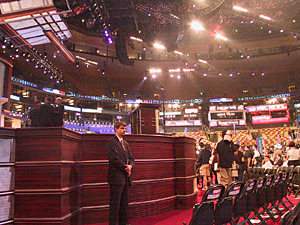Photos
More from MPR
Your Voice
| |||||||||||||||||||||||||||||||||
Kerry officials push positive spin on tight Midwest races
July 26, 2004
Boston, Ma. — As the Democratic National Convention officially opened in Boston on Monday, strategists for Sen. John Kerry's campaign in the Midwest attempted to minimize the strong showing in Minnesota polls by President George Bush in a state that historically has been a Democratic stronghold.
Bush's popularity in Minnesota has turned it into a "swing" state, one of about nine states that both campaigns consider pivotal for winning the White House. Minnesota joins Florida, Iowa, Nevada, New Hampshire, New Mexico, Ohio, Pennsylvania, and Wisconsin as states being targeted by both sides in the campaign.
 | |||
At a briefing for Midwest media Monday, Sen. John Kerry's senior strategist, Bill Knapp, chided Republicans, who he says are using issues such as same-sex marriage to woo voters that "Republicans should have already locked up."
But Knapp dismissed suggestions that Minnesota is a state that is one that Democrats normally would've considered a "win" by now. "I disagree with the assertion that Minnesota is normally a lock," he said. Knapp refused to say why he thought President George Bush was running strongly in a state where Democrat Al Gore won four years ago, if only by a slim margin, and would not answer a question about what vulnerability Kerry may have in the state.
He acknowledged, however, that the suburbs are providing plenty of support to Republicans.
Normally, a presidential candidate will pick up about 5 percent in the polls following his party's convention. Knapp said he doesn't expect see that happening because so many voters have already made up their minds.
"This is a highly polarized electorate," he said. "They (Republicans) have taken some of their best shots at us (in the Midwest). We've gone dollar-for-dollar in paid media."
Few other Democrats gathered in the party stronghold of Boston were willing to discuss anything but Kerry's strengths. The convention theme -- strong at home, respected abroad -- is designed to answer suggestions that Kerry is weak on defense, and seeks to capitalize on a lackluster economy under the Bush administration.
 | |||
Even the party's platform is tailored to be muscular - with more than 100 references to "strong," "strength" or "strengthen." Before getting to Boston, platform writers persuaded activists to drop demands to describe the Iraq war as a mistake.
A walk around the convention center yielded no evidence that any other candidates are still in the race for the party's nomination, however nominally. Large displays of photographs of Kerry in Vietnam battle fatigues greeted delegates. There were no images of his subsequent war protest years. Backstage, a holding pen held thousands of Kerry/Edwards signs, which will be used Thursday when the junior Massachusetts senator accepts the nomination, something he locked up following his Super Tuesday wins in March.
And there was little doubt that the people calling the shots at this highly-scripted public event, are from the Kerry team.
Ohio congressman Dennis Kucinich and activist Al Sharpton are still in the race. Both are scheduled to speak to the convention on Wednesday. Minnesota has several Kucinich delegates, all of whom pledge to support Kerry. There are no Sharpton delegates.
Hours before the convention opened, top Democratic leaders gave pep talks to the delegates at their Cambridge hotel's ballroom. They included Walter Mondale, who is the chairman of the delegation, and Sen. Mark Dayton.
But the delegates seemed most interested in humorist Garrison Keillor, whose new book of Democratic principles was given away to each delegate. Keillor, who hosted a fundraiser later in the day, said he's in Boston to focus on helping Democrats win more seats in the U.S. House.
He took several shots at the Bush administration during his talk to the delegates, saying that John Kerry "never attached his wagon to yahoos, and doesn't appeal to hatred."
There was little evidence of a Republican effort to counter the Democratic criticisms in Boston, although Minnesota U.S. Sen. Norm Coleman is due to arrive late Monday night, and is holding several media sessions outside the Fleet Center on Tuesday before leaving town shortly thereafter.
Concerns about a city in gridlock failed to materialize as the convention opened. Many Bostonians heeded warnings not to drive near the Fleet Center. The "pen," a razor-wired, chain-link fenced-off area for protests, was virtually empty as delegates arrived. But under the convention logistical plan, delegates will never see the protestors held in the "free speech zone." Delegate buses are ushered into a fenced off area near a security checkpoint, far from the zone.
Security is tight throughout Boston. Helicopters buzzed over the city and police and Secret Service presence is meant to be stifling. But lines to get into the Fleet Center were relatively short.
|
News Headlines
|
Related Subjects
|


